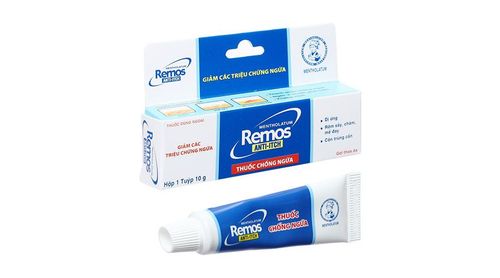This is an automatically translated article.
Lidotrans is used for temporary numbing and pain relief from minor burns including sunburn, skin abrasions, insect bites and other painful conditions affecting mucous membranes. Some Lidotrans products are also used to numb the lining of the mouth and throat before medical procedures are performed.1. What are the effects of Lidotrans?
Lidotrans, also known as lidocaine, is used to temporarily numb and relieve pain from minor burns including sunburn, skin abrasions, insect bites, and other painful conditions affecting mucous membranes. Some Lidotrans products are used to numb the lining of the mouth or throat before certain medical or dental procedures. Lidotrans is also used to relieve pain during dentures and when your gums are adjusting to dentures. However, Lidotrans should not be used long-term to relieve pain caused by ill-fitting dentures.Lidotrans belongs to a class of drugs known as local anesthetics, and should not be used to treat painful teething in infants and young children due to the increased risk of serious side effects. Consult your doctor for more details and other ways to treat teething pain.
2. How to use Lidotrans
Read the drug information carefully before you start taking Lidotrans and each time you refill it. Before certain medical procedures, Lidotrans is usually taken by healthcare professionals. If you are self-medicating, use it as directed by your dentist or doctor.Apply a thin layer using the smallest amount needed to cover the affected area. The dose of Lidotrans will be based on your medical condition and response to treatment. For children, the dosage is also based on age and weight. Use Lidotrans regularly to get the most benefit from it. Never increase the dose or abuse the drug for longer than prescribed. This not only makes the condition improve faster, but also increases the risk of unwanted effects.
If you are using Lidotrans ointment to help relieve pain during new dentures, apply the ointment with clean hands to all surfaces of the denture in contact with the gums. To reduce the amount of Lidotrans that can be swallowed, do not apply ointment to the chewing surface of the denture. Continue to consult your dentist regularly during fitting. Follow your dentist's instructions carefully and wash your hands after use.
When Lidotrans is used in the mouth or throat, the numbness can make it difficult to swallow and increases the risk of swallowing by mistake or choking. Do not chew gum or eat for 1 hour after using this product and while your mouth or throat is numb. It is especially important that children do not eat or chew gum for at least 1 hour after using Lidotrans. Be careful not to accidentally bite your tongue or mouth.
If you are applying this medication to other mucous membranes or skin, clean the affected area before use, if possible, and apply with clean hands as directed. For broken or burned skin, you can apply the ointment with a sterile gauze pad. Wash your hands after use unless you are treating an area on your hands.
Lidocaine begins to numb the affected area within 5 minutes of application. If you are using this product before certain procedures, let your doctor know if the area does not feel numb or the numbness does not go away. If you are using Lidotrans for pain/discomfort, tell your doctor if your condition persists or gets worse.

Bạn có thể cảm thấy khó nuốt trong quá trình uống thuốc Lidotrans
3. Undesirable effects when using Lidotrans
Some unwanted effects that may occur when using Lidotrans include:Stinging sensation Mild Burns Dizziness Dizziness Serious side effects if you overdose or are sensitive to the drug: dizziness, drowsiness, shallow breathing, changes in mental status (such as confusion, anxiety), tremors, seizures, vision changes (double vision, blurred vision), ringing in the ears, fainting, bluish-gray skin, fatigue unusual fatigue, shortness of breath, abnormal heart rate changes,... Before prescribing, doctors always weigh the benefits of Lidotrans more than the risk of side effects. However, some cases when taking Lidotrans medicine may still occur unwanted effects. Therefore, when you see unusual signs, especially when an allergic reaction occurs such as rash, itching or swelling of the face, tongue, throat, difficulty breathing, severe dizziness, ... In school In this case, the patient should immediately notify the doctor for prompt medical intervention.
4. Some notes when using Lidotrans
Some notes when using Lidotrans include:Report a history of allergy to Lidotrans or other anesthetics (including amide-type anesthetics such as bupovacaine, prilocaine) or to any other allergies. Lidotrans medicinal products may contain inactive ingredients and may cause side effects or other serious problems. Inform medical history such as: sores or bleeding in the area to be applied, severe infection with high fever, heart problems (such as slow, irregular heartbeat), severe shock, liver disease , kidney disease, certain blood disorders (methemoglobinemia). Do not drive, use machinery, or do any activity that requires alertness until you can do it safely. Because Lidotrans can make you dizzy, drowsy and cause vision problems. Limit alcoholic beverages such as wine, beer and other stimulants. Before surgery tell your doctor or dentist about all the products you are using including over-the-counter medicines, prescription drugs, vitamins, and herbs. Children may be more sensitive to the side effects of Lidotrans, so caution should be exercised when giving it to children. For pregnant and lactating women, Lidotrans should only be used when absolutely necessary. Talk to your doctor about the risks and benefits and harms of the medicine to your baby if it gets into your breast. If you forget a dose of Lidotrans, take it again as soon as possible. However, if the time you remember to take your missed dose is close to the time of your next dose, skip the missed dose and take the next dose on the same schedule. Absolutely do not use more than double the dose than the treatment regimen. Lidotrans can be harmful if swallowed. An overdose of Lidotrans can cause serious symptoms such as changes in vision, hearing, dizziness, severe drowsiness, fainting, loss of consciousness, tremors trembling, convulsions, irregular slow heart rate, shallow breathing,...
5. Drug interactions
Drug interactions may decrease the effectiveness of Lidotrans, or increase the effect of unwanted effects. Tell your doctor about all other medicines you are taking, including prescription and over-the-counter medicines and herbal products. Do not start, stop, or change the dose of any medicine without your doctor's consent.
Không tự ý ngừng thuốc Lidotrans nếu không có chỉ định từ bác sĩ
6. How to store Lidotrans
Store Lidotrans at room temperature, away from moisture and light, and close the lid tightly after use. Do not store Lidotrans in a humid place or in the freezer. Each medicine will have different storage methods, so read the Lidotrans storage instructions carefully on the packaging, or ask your pharmacist. Keep Lidotrans out of the reach of children and family pets. When medicine is past its expiration date or cannot be used, dispose of it properly. Do not arbitrarily dispose of Lidotrans into the environment such as plumbing or toilet unless requested. Please consult your waste disposal company or pharmacist on how to safely dispose of Lidotrans to help protect the environment.In summary, Lidotrans is used to temporarily numb, relieve pain from minor burns including sunburn, skin abrasions, insect bites and other painful conditions affecting mucous membranes. Some Lidotrans products are also used to numb the lining of the mouth and throat before medical procedures are performed. However, Lidotrans can cause some unwanted effects, drug interactions and when swallowed, so tell your doctor what medicinal products you are taking to reduce the risk of side effects and increase effective for treatment.
Please dial HOTLINE for more information or register for an appointment HERE. Download MyVinmec app to make appointments faster and to manage your bookings easily.
Reference source: webmd.com












